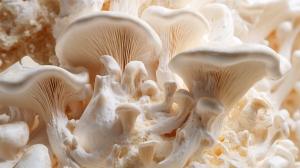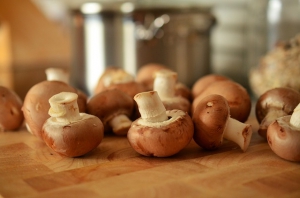In 2014, with the joint efforts of the leaders of China and Fiji, the China-Fiji Juncao Technology Demonstration Center was established. Nine years later, the China-Pacific Island Countries Juncao Technology Demonstration Center (CPICJTDC) was unveiled in Fiji.
"The giant Juncao grass grows amazingly. It gets 5 to 8 centimeters taller per day in November," said Lin Xingsheng, team leader of the China-Fiji Juncao Technology Demonstration Center. "We have built a modern agricultural science and technology park covering an area of 3 hectares, integrating the 'plant-fungi-animal' cycle. In addition, there is also a breeding base of about 10 hectares for Juncao seeds," Lin added.
The Chinese technical personnel at the demonstration center actively explored and, based on the local climate and soil conditions, cultivated a variety of mushrooms using high-quality Juncao grass as nutrients, bringing tangible benefits to local farmers.
The establishment of the demonstration center has ended the history of Fiji's inability to grow mushrooms, making mushroom cultivation an emerging industry for prosperity, said Ateleni Kaloumaira Vuinakelo, area field officer from Fiji's Ministry of Agriculture and Waterways, who closely collaborated with Chinese experts in 2012 to introduce Juncao technology to Fiji.
Under the careful guidance of Chinese experts, the Fijian people gradually mastered the skills of cultivating over 10 varieties of edible mushrooms such as oyster mushrooms, Ganoderma lucidum, and termite mushrooms, leading to a significant increase in income.
Read the full article here.
A team of Western mycologists (fungi experts) spent the past two summers digging deep in Newfoundland dirt to investigate the might of mushrooms and found what lies beneath truly is 'the main character' in most terrestrial ecosystems.
Fungi, which produce mushrooms, are critically important in most earthbound ecosystems as they provide life-sustaining mineral nutrients to plants while decomposing their remains, and recycling both organic and inorganic byproducts throughout the biome as they grow and reproduce.
"A lot of ecologists are beginning to realize that mushrooms really run the world. We've quite naturally spent a lot of our time focusing on things above ground, things that we see like plants, animals, and birds," said Western biology professor Greg Thorn. "But in fact, the plants are very closely associated with fungi, and basically wouldn't be there (above ground) without them."
Please read the full article here.
Source: Phys.org provided by University of Western Ontario
Feed Your Immune System
We know the immune system is important for staying healthy, but what exactly is it and what can we do to support it?
The immune system is a complicated network of cells, tissues and organs in your body that protect against infection and disease. Given that there are so many pieces to the puzzle, there’s not one easy fix that can transform a weak immune system into a strong one in a snap of the fingers, but nutrition certainly plays an important role in its function.
Key Nutrients For Supporting Your Immune System
There are certain micronutrients in the foods we eat that play a key role in supporting the immune system1. An important step you can take for your immunity is to ensure you’re getting the recommended daily allowances2 of these nutrients. Find out how each of them serves your body and which foods you can find them in.
Mushroom Council has developed a "Feed your immune" system campaign, where they talke about nutrients in food and especially in mushrooms.
For the complete article, click here
Source: Mushroom Council
























